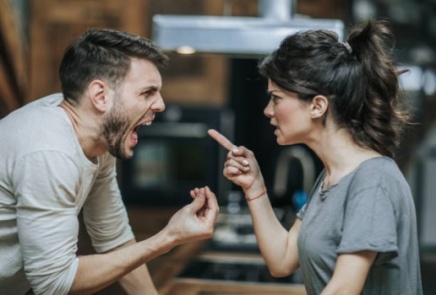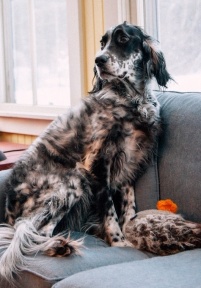OK. Not really about business creativity & communications, etc., but I decided to toss this in for fun.
In how many advice columns and mantras is it said a triangle is an ugly shape from which healthy relationships cannot grow. Three of anything unless it’s a grouping of items in a sentence or the set-up of a classic joke doesn’t cut it. Is it an odd number thing? Five seems to work among friends and work teams, seven seems to be challenging…it invites cliques to form.

Anyway, we presume a couple is a basis for the highest form of intimacy. From best friendships to marriage, monogamy is more the rule than the exception. But that brings its own problems, doesn’t it?
All couples share dark moments from misunderstandings, misfortunes, malfeasance. People change, grow, and move towards or away from each other. How deep the rift, how often the cuts and makeups and how long the cycle continues is a metric of whether the relationship has legs for a long run. Is it time to split up the books and furniture? Before this crossroads, can a relationship recover? Hey, don’t ask me—I’m married fifty years, but you’ll not get good advice that I never listened to. But I did do the research.
You see when there is an object of affection, a neutral third party uniquely qualified to step into the fray, there is hope for a fractious couple. And an ‘object’ of mutual affection within a troubled relationship offers a possibility the transference of caring might roll over to the couple. According to my readings, scientific definitions, and keen observation, intense situations can be improved. And there is only one—and again—my experience here—only one “equiniminous third” up to the task.
Enter Canis lupus familiaris.

Dogs are exceptionally successful in making triangles from duos. Rounded over by a dog in the house, most adoptive dog parents benefit from the neutral third. Not to win approval – dogs always approve of you unless mistreated – the acknowledgment that another sentient being with feelings is enough to make humans, well, more human.
Let me explain.
So, there’s a dog nearby you’ve raised or taken in. Doesn’t matter. Loyalty comes quickly if you love your dog—that’s a certified caveat. If you can’t do that, stop here – I can’t make my point.
Dogs don’t take sides and don’t require details. They don’t care if you cheated and she wrecked your BMW. But dogs have superb emotional antenna. They know when the chemistry is off. They watch body language, more impressively they smell the emotions as odors you excrete naturally. With 30 million nasal sensors they have your fully cataloged. And of course, they are incredible listeners – they may not know the language, but they get the gist.
They can’t stand yelling and will remove themselves–or act out–if there is screaming and throwing of objects. Remember dogs are creatures of habit. When there is a tilt in their world, they are uncomfortable. And they are empathetic – not in a human way, they comfort in a canine way. But at the outset, they are nervous, fidgety and want normal back. A dog is not my brother, nor my wife’s grandma. We want a dog to be a dog.
A dog will offer its physical self to assess if there is an opportunity for affection – to give or receive. If there’s no violence your dog will approach one of you – I don’t know why. Each one of us thinks the dog thinks we are the ‘alpha’ when research shows neither of you is.
The dog will make himself available and if you look their way, you’ll likely get a look in return. And then he may approach. He may make physical contact, not just because you need it-he needs reassurance too. So, you open your arms and he’ll sidle over for a rub or scratch. He feels better and you do, too. The temperature in the room will go down a notch.
If the room is cooling off, so is the dog. Now, he might lay down at your feet—or hop up on the couch (if permissible) to get next to one of you. The dog love begins – you’ll rub, scratch, nuzzle, coo, whatever – and this distraction allows for a real cooling off period. The dog’s very being-ness has distracted you. Now’s the time you can start a conversation and find common ground. Take Harley for a walk. He’ll be himself, the real dog, calm or excited, as he regains his emotional balance. This is his stage and his nature, and you are a mere ‘bit player’. When you return, there’s an opportunity for a rational discussion – as you fill his water dish or food bowl and minister to him. This releases your own hormones leading to a relaxation of emotional tension.
This is the concept I mentioned, the neutral third. The dog cares less about issues and more about behavior returning to normal. And he can be more normal, too. As vocal tonality and dynamics soften, your odor indicates a return to a more congenial state. And the dog senses you are cool, and he knows his habitat is returning to the status quo.
Well, we’ve made a home to more than a dozen dogs over fifty years and regardless of breed, they were all particularly sensitive to the household mood. Some better than others naturally – and I mean naturally as in their nature.
During our marriage, like most, my wife and I have had monstrous battles. My crass behaviors, her failures I didn’t easily forgive, nasty words, real anger, slamming doors – the whole bit. Through it all every dog we were privileged to have was the soft tip of the triangle, blunting anger and offering themselves to distract us. Some were pedigreed champions and some of a dubious lineage.
I don’t believe the love of any animal can change one’s fundamental behavior but in day to day life, with its wins and losses, anger, and joy, they were all necessary for our emotional maintenance.
We wouldn’t have made fifty years without them.
CODA:
Finally, some points about having a dog in the household that contributes to personal well-being. Consider when each partner is happy and healthy, they have more to give to the relationship, what therapists call the third person–the marriage. Don’t overlook the dog is also a subject of discussion – a neutral topic that partners can discuss even when all other communication stalls.
Banking emotional and physical reserves are helpful by supporting self-control, a most important trait in the ongoing sustenance of a relationship. A lower heart rate, lower blood pressure, less depression, and a decrease in general illness are fully proven benefits. The more obvious: exercise, a better social life, and heart health. And happiness—playing fetch or simply petting your dog increases the release of oxytocin, the feel-good hormone and lowers cortisol, the stress-inducing, fat-making hormone.
And the obvious, especially among the growing ranks of seniors, relieving loneliness, anxiety, and faster recovery from stressful incidents.
When a dog is present in the home, and its human family provides love and care, the more likely the tone is set for these behaviors to be available as an emotional resource in times of difficulty in the marriage. No doubt no dog can retrieve a hopeless relationship. Interestingly, divorce attorneys often say one of the biggest bones of contention in a breakup is who gets to keep the dog.
As for me and my wife, currently without a dog for the first time in fifty years, few days go by when we don’t look for new residents in our local animal shelter and who among our friends and relatives have puppies on the way.
The heck with the new carpets, I’ll take the new puppy smell, the fur against my cheek, even the 6 AM walk, for the licks and doggie kisses any day.

Great post 🙂